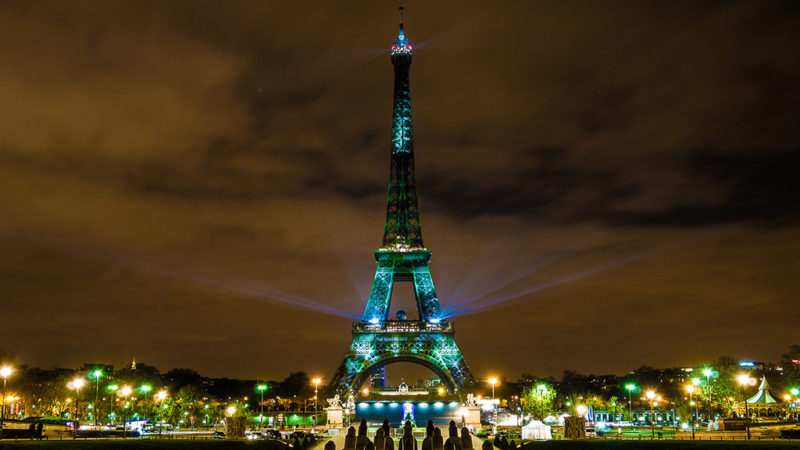
By Karen Lefkowitz and Tetra Balestri
As world leaders in Paris begin to negotiate how each nation and its citizens can work to reduce greenhouse gas emissions and slow the effect of climate change, we ask IoES experts from different backgrounds – law, humanities, engineering, marine biology and urban planning – to express their views on what outcomes need to emerge from the international gathering.

Cara Horowitz, director and professor, UCLA Law Emmett Institute on Climate Change & the Environment and IoES
There is more momentum on the international stage for an agreement that applies to all countries on climate change — developed and developing countries — than I think anyone has seen in many years. For Paris to be a success, we will need to see an agreement at the Conference of the Parties that creates meaningful obligations for all countries to reduce their carbon emissions. If we get that, it will be a tremendous breakthrough.
The history of the Framework Convention has been one that has treated distinct classes of countries very differently with respect to their climate emissions obligations. Under the Kyoto protocol for example, developed countries took on significant climate emission reduction obligations, however, developing countries did not take on those obligations, and, of course, the U.S. never signed it. Under the Kyoto protocol, we were left with a regime that didn’t cover China, India, or the United States. The opportunity in Paris is one that may break that dynamic and move forward into a regime where all countries are doing their part to reduce climate emissions.
There is a real opportunity to create a new international climate regime. And, there is a recognition that we are running out of time to do it. We’re coming into Paris with significant commitments already on the table from countries like China, the United States, India and the EU. What sets this COP apart is the optimism but also a lot of hard work that has already been done heading into Paris to create the conditions for coming to an agreement.
Ursula Heise, professor, Department of English and IoES
What I’m hoping around the summit, maybe not the negotiations over numbers and treaties in particular, but just the conversation that the summit has and will continue to generate, is the possible emergence of different kinds of stories about climate change. Apocalyptic narrative has been a staple of environmental thinking and writing since the 1960s and is back with a vengeance. It is not very effective and doesn’t seem to have shifted public opinion or public policy in a major way. I’m not thrilled with the way in which the pervasive rhetoric of disaster has come to accompany climate change in a fairly predictable breakdown of suffering and death. Developing more nuanced stories will be an exciting project.
I bring up the importance of narrative story because one thing about these climate summits is that things happen inside negotiation rooms. There is a whole outer circle not participating in the negotiations: people who are lobbying or demonstrating or who want to bring another perspective on climate change to the attention of the people doing the negotiating. There’s this whole outer circle of us who are watching via the media across the globe. Inevitably there’s going to be other conversations in those two outer circles and I hope the summit will be an occasion to revisit some of the stories and images that we associate with climate change and to think about what alternative and productive templates for thinking about the future might be.
Michelle Thompson, doctoral candidate, Environmental Science and Engineering, IoES
This summer while I was interning at the U.S. Department of Energy I was able to take the Washington Seminar course at the U.S. State Department. The course provided Foreign Service and Civil Service personnel, with a solid grounding in the fundamentals of energy policy, energy markets, conventional and renewable energy technologies and climate change. One of the speakers briefed us about the potential the climate change agreement has on low-carbon investments and climate financing for developing countries. The upcoming United Nations climate change conference in Paris stated that each country has already submitted their negotiations prior to the December meeting. I feel optimistic about our role in the negotiations after hearing President Barack Obama and China’s President Xi Jinping joint statement in September on the importance for a low-carbon transformation of the global economy. The bilateral agreement of the two largest emitters of greenhouse emissions and two largest economies was a positive international model for other countries to achieve in their goal-setting. Lastly, I was very impressed by Obama-Xi joint statement that China will implement an emissions trading system in 2017.
Zackary Gold, doctoral student, Barber Group, Ecology and Evolutionary Biology
I’m optimistic about the Paris climate talks this year because it will be the first time all of the world’s countries come together to set these binding agreements on capping the amount of CO2 we’re putting in the atmosphere. There is some negative energy going around that the limits they’re going to set won’t keep a lot of ecosystems healthy — that the amount of warming that’s going to happen will be above a lot of tipping points. But I’m really hopeful because this will be the first time, in all of our lifetimes, that we’re taking this issue really seriously. By “we” I mean the United States, China, and India — the big players in carbon emissions, now and the upcoming decades. I’m hopeful we’ll set these limits and push them forward. We need to work to actively reduce carbon emissions because a lot of the geoengineering solutions, a lot of the crazy ideas getting thrown around, don’t solve the problem of ocean acidification, which I think is going to be one of the biggest problems climate change is going to pose to our oceans: the systems that provide us oxygen and the systems that feed a billion people. In the negotiations I hope that nations in the west, in Europe, in the U.S., strive to supply the tools and resources needed to developing countries to be able to seriously address climate change — whether that’s energy technology or new conservation management practices to protect the most biodiverse ecosystems in the world, I truly hope that’s something in a climate fund that gets created. This is something policymakers should really strive for.

Laurel Hunt, Urban Planning, M.S., 2014, Leaders in Sustainability, IoES and Center for Urban Resilience, Loyola Marymount University
I think the real story at COP lies within the concept of adaptation. Regions all over the world have been taking unprecedented steps to adapt to climate change and the work is impressive. One of the best outcomes of COP 21 would be drawing attention to and securing funding for these efforts in the long term. I mean not just funding for pilot projects, but providing security for adaptation as a viable response to climate change. The UN’s Intergovernmental Panel on Climate Change (IPCC), the world’s foremost authority on climate change science, stated in its most recent report in 2014 that adaptation and mitigation strategies are the key to preparedness. Even though we’re talking about reducing greenhouse gas emissions and coming towards a legally binding agreement to do so, adaptation is critical. COP 21 is an opportunity to showcase adaptation work that is already being done and get people talking about adaptation networks. Cities, organizations, individuals, even entire sectors (like energy) can leverage networks to interact and collaborate. Being part of a network has numerous benefits related to knowledge creation, standards, financing, technical skills, best practices – there’s a lot of other ones. IPCC has made it very clear that adaptation responses will involve co-benefits and synergies but also trade-offs. At the end of the day climate change adaptation is an opportunity to make our society more just, equitable, and resilient.
To learn more about the 2015 Paris Climate Conference visit www.cop21.gouv.fr/en.
